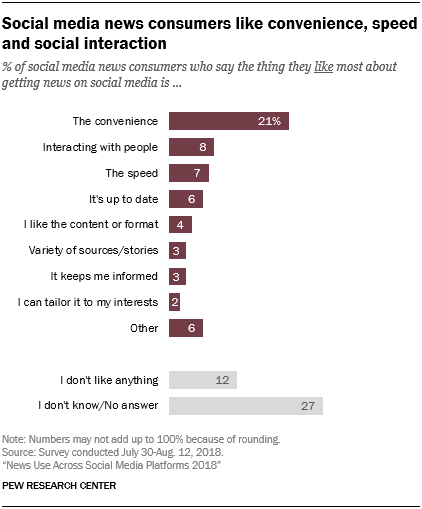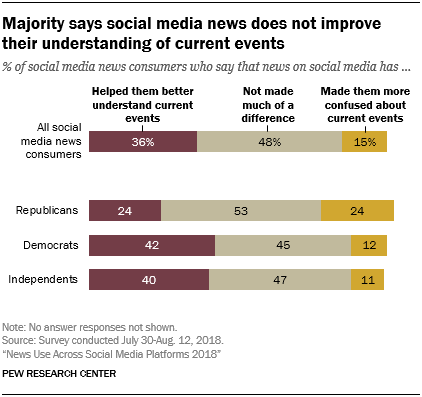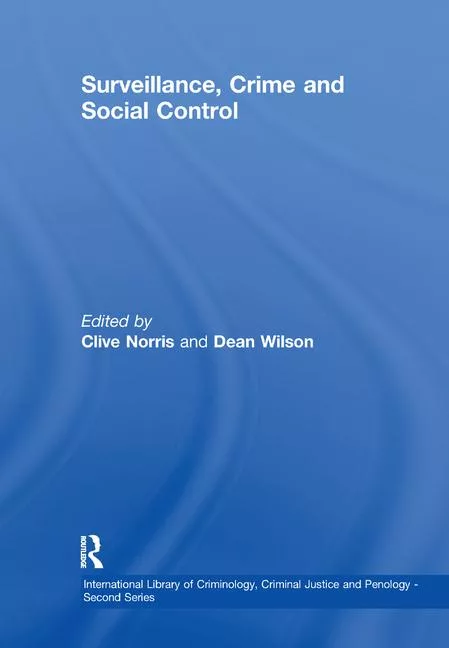Most Social Media News Consumers Concerned about Inaccuracy, but Many Still See Benefits

Republicans are more likely than Democrats and independents to be concerned with the inaccuracy of the news they see on social media. Among social media news consumers, about three-quarters of Republicans say this (72%), compared with 46% of Democrats and about half of independents (52%). And, while there are some age differences in expectations of the accuracy of social media news, this party divide persists regardless of age.
Concerns about the inaccuracies in news on social media are prevalent even among those who say they prefer to get their news there – among this group, 42% say that they expect the news they see to largely be inaccurate. Still, those social media news consumers who prefer other platforms such as print or television for news are even more likely to say they expect the news on social media to be largely inaccurate.
Not only do social media news consumers expect the news they see there to be inaccurate, but inaccuracy is the top concern they bring up about information on social media. When asked an open-ended question about what they dislike most about getting news on social media, concerns about inaccuracy top the list, outstripping concerns about political bias and the bad behavior of others.2 Specifically, about three-in-ten (31%) social media news consumers say that inaccuracy is what they dislike most about the experience. Included in the responses about inaccuracy were concerns about unreliable sources, lack of fact checking, and “fake news.”
Politics surface as another negative aspect of social media, though at a lower rate – 11% who at least occasionally get news there say there is too much bias or political opinion, either on the part of the news organizations or the people on the platform. About the same share of social media news consumers (10%) say they dislike the low quality of news – such as lack of in-depth coverage, or clickbait-style headlines.

Even though social media news consumers have concerns about the accuracy of the information there, they also cite some benefits of getting news on social media, which may help explain why getting news on the platform is still so common.
The most commonly named positive thing about getting news on social media is convenience – 21% say this is what they liked most, with responses such as “It’s very accessible,” “It’s available at the touch of a button” and “I don’t have to go looking for it.”
Respondents also say they like the interpersonal element: 8% of social media news consumers say they enjoy interacting with others – whether through discussing the news, sharing news with friends and family, or seeing what others’ opinions are. Speed and timeliness are also mentioned as positive aspects of getting news on social media – 7% say they like how quick it is to get news on social media, and 6% say they like that news there is up to date, with descriptions like “up to the minute” or “the most current.”
A fair share of respondents (12%) say they do not like anything about getting news on social media. This is higher than the percentage who volunteered that they do not dislike anything about news on social media in the previous question (only 4% say this).
About a third (36%) of the people who get news on social media say it has helped them better understand current events. Nearly half (48%) say it doesn’t have much of an effect on their understanding, and 15% say that news on social media has made them more confused about current events.
Among those who get news on social media, Republicans are less positive than Democrats and independents about how news there influences their understanding of the world around them: About a quarter (24%) say that social media news helps them better understand current events, compared with 42% of Democrats and 40% of independents.
Age is also a factor in the way people view the role of social media. Younger social media news consumers are more likely to say it has impacted their learning for the better. About half of social media news consumers ages 18 to 29 (48%) say news on social media makes them better informed, compared with 37% of those 30 to 49, 28% of those 50 to 64, and 27% of those 65 and older.
Looking for a reprint of this article?
From high-res PDFs to custom plaques, order your copy today!







